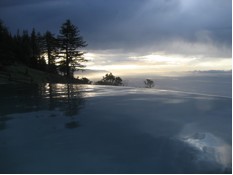If you think climate change just means hotter summers in California, think again. The writer of this week’s guest post argues that we’ll all “feel the heat” in myriad ways, both obvious and subtle.
Climate and Nature
by Anthony Barnosky
Some impacts of climate change in California are pretty obvious, things like rising sea level submerging large parts of the San Francisco Bay region, or drought cutting into our water supplies. Less obvious, but every bit as important, are impacts on something you probably don’t even know you have: your relationship with nature.
One part of that relationship is the concept of “ecosystem services;” the direct benefits you get from nature. California’s Climate Action Team highlighted some of the state’s ecosystem services in their recent report. Examples include the ski trip you may have taken this winter, the salmon fillet you may have bought at the grocery store, or surprisingly, even your hamburger.
 Snow will be less, soggier, at higher elevations, and on the ground for fewer days of the winter, melting some of the $500 million-per-year revenues of the ski industry–not to mention melting your favorite ski run. Altered river dynamics and temperatures will almost certainly cut into the state’s $33-million-per-year salmon industry. Climate-caused loss of forage means that in 2070 California’s cattle ranchers will be losing up to $92 million in comparison to today’s markets, which means higher beef prices at the grocery store. Combined, the losses in these ecosystem services likely will cost the state’s already suffering economy well over a hundred million dollars per year as we move into the next few decades. And those are just three of many ecosystem services that will be affected.
Snow will be less, soggier, at higher elevations, and on the ground for fewer days of the winter, melting some of the $500 million-per-year revenues of the ski industry–not to mention melting your favorite ski run. Altered river dynamics and temperatures will almost certainly cut into the state’s $33-million-per-year salmon industry. Climate-caused loss of forage means that in 2070 California’s cattle ranchers will be losing up to $92 million in comparison to today’s markets, which means higher beef prices at the grocery store. Combined, the losses in these ecosystem services likely will cost the state’s already suffering economy well over a hundred million dollars per year as we move into the next few decades. And those are just three of many ecosystem services that will be affected.
A second part of your relationship to nature is the species around you, that is to say, biodiversity. Simply put, biodiversity is which species live in a place, and the extent to which those species are rare or common. In general, biodiversity means more productive and healthier ecosystems, which translates as more benefits to humans that inhabit those areas. As it turns out, California is a globally recognized biodiversity hotspot, unique in the world. But biodiversity losses from global warming promise to be severe: one study predicts that two-thirds of the 2387 plant species found only in the state will lose 80% of their range within the century.
 The third part of your relationship to nature is how it makes you feel. There’s no question: you can’t get the same feeling you get looking at a giant redwood anywhere but in a redwood forest. Among species that may have little or no suitable climate left in California, however, are its coastal redwoods and sequoias.
The third part of your relationship to nature is how it makes you feel. There’s no question: you can’t get the same feeling you get looking at a giant redwood anywhere but in a redwood forest. Among species that may have little or no suitable climate left in California, however, are its coastal redwoods and sequoias.
Such impacts of climate change on nature are not confined to California. Many other reports indicate that global warming is redefining our relationship to nature worldwide. As with other impacts, this one can be partially mitigated by reducing greenhouse gas emissions immediately, but also will require some new management strategies for preserving nature in the age of global warming. California, in particular, has a lot to lose.
Anthony D. Barnosky is a Professor of Integrative Biology at the University of California, Berkeley and author of the recently published Heatstroke: Nature in an Age of Global Warming. You can read more on this topic in his blog. Photos by the author.
Barnosky is scheduled to appear Saturday as part of Berkeley’s “Cal Day” activities. His talk is scheduled for noon at the Valley Life Sciences Bldg, Room 2060, followed by a book-signing at the T-Rex (which is hard to miss).
2 thoughts on “The Insidious Side of Climate Change”
Comments are closed.

Tony< it appears you have reached many in the family as well as the political leadership….we see climate change as here and now…thank you…